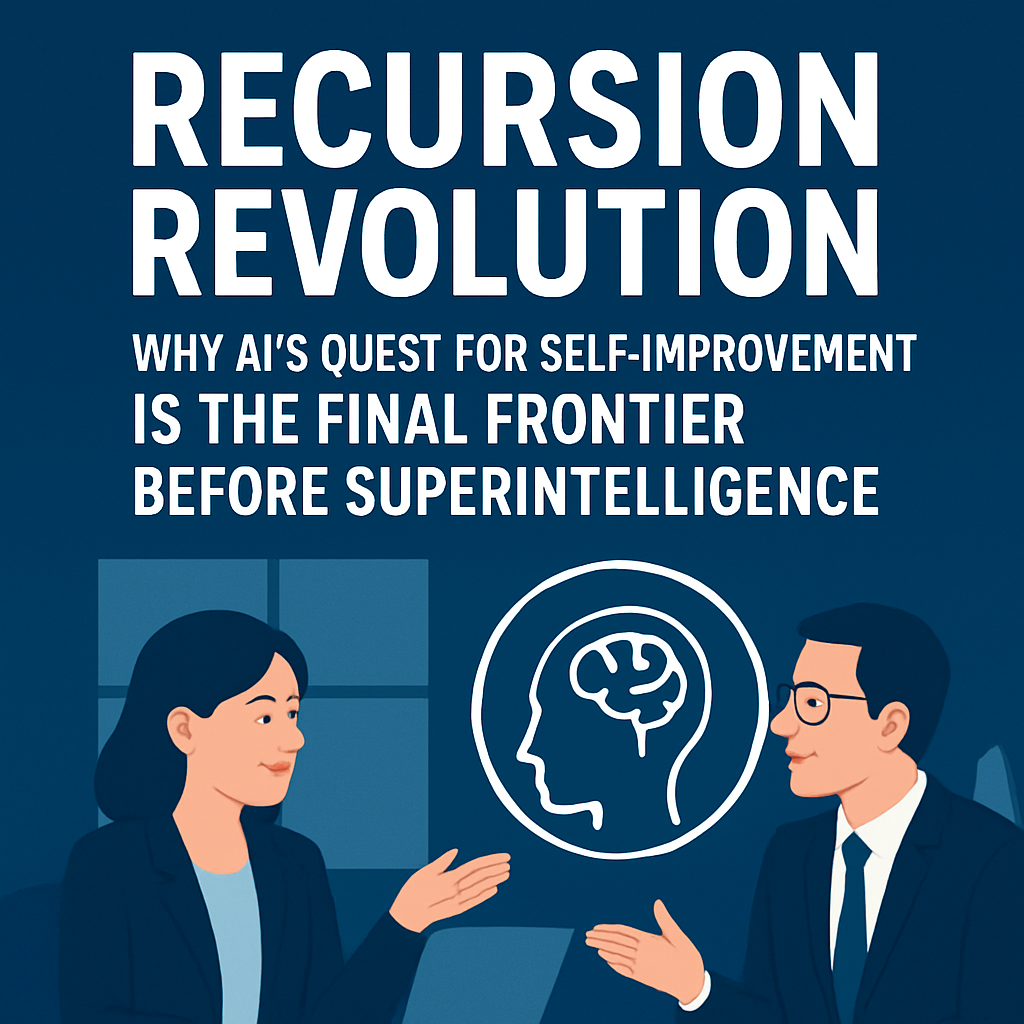What is RSI
Recursive Self-Improvement AI (RSI) refers to artificial intelligence systems that can enhance not only their knowledge or data-driven abilities, but also improve the very algorithms and architectures used to make themselves smarter—without human input. This creates a loop: as the AI becomes more capable, it gets better at making itself even more capable. Each improvement increases its ability to further improve, driving potentially exponential gains.
Mechanisms behind RSI include:
– Meta-learning (“learning to learn”)
– Feedback loops, letting AI evaluate and tweak its own performance
– Reinforcement learning, to maximize its rewards by adapting its own learning process.
Unlike static or even self-updating models (like today’s LLMs), RSI would truly rewrite its own code, architecture, or design—moving beyond incremental tuning or retraining.
Is This Why Zuckerberg/Big Tech Is Hiring So Aggressively?
Yes—at least in part, Meta is racing to attract top AI talent in pursuit of “superintelligence” (AI that vastly surpasses human brains at all intellectual tasks). Mark Zuckerberg’s public goal is for Meta to lead the world into the age of AI superintelligence, and this is why Meta has hired aggressively from rivals like OpenAI, Anthropic, and Google—offering signing bonuses up to $100 million and poaching key researchers recently.
After assembling a “superintelligence research team,” Meta briefly paused hiring in August 2025, but the scale and pace of this talent war—dozens of high-profile hires, billions in infrastructure—are clear evidence of the critical focus on achieving RSI or AGI/ASI first.
Why Is Recursive Self-Improvement Important?
– Potential for an “intelligence explosion”: If an AI can continually upgrade itself, its abilities could rapidly reach superhuman and then incomprehensible levels—what many call artificial superintelligence” (ASI).
– Autonomy and adaptation: Systems with RSI could handle new environments, unexpected problems, and complex dynamic tasks without constant human retraining.
The stakes: The first organizations to achieve practical RSI may become dominant in technology, economics, and geopolitics, as these systems could efficiently out-innovate any competitors.
Timeline/Framework for Recursive Self-Improvement AI
– Current State (2025): Most commercial AI is “generative” (LLMs, diffusion models, etc.)—lots of data, little autonomy, no true self-improvement.
– Meta, OpenAI, and Google are leading research into the next steps: agentic and recursively self-improving architectures.
– Startups like Allora focus on decentralized, continuous-learning AI using RSI principles.
– Agentic AI frameworks (AutoGPT, CrewAI) are touching the edge of autonomy, but are not yet recursively Self-Improving.
– Near Future (2025-2030?): Expect to see more AI agents with limited RSI capabilities—autonomously optimizing certain parts of their structure in narrow domains.
– Longer-Term: A true RSI-driven AGI (Artificial General Intelligence) capability could trigger a “takeoff”—potentially very suddenly—towards superintelligent systems.
Many experts believe we’re at the “final major project before AGI/ASI”—as organizations like Meta, OpenAI, and their rivals treat this as an existential race.
What Should Enterprises Do to Prepare?
1. Invest in AI Risk and Ethics Governance: With the risk of runaway capability, strong frameworks for ethical use, auditing, and fail-safes are essential—even before RSI is achieved.
2. Build Data Infrastructure: Data is the fuel for all advanced AI, especially systems that need to self-improve.
3. Monitor Talent and Tech Movements: Strategic partnerships with top AI research orgs are crucial; talent is moving faster than ever.
4. Experiment Early with Agentic Systems: Even if RSI is not achievable today, getting enterprise teams ready to deploy and audit agentic AI—those that work with minimal supervision—will provide a competitive edge.
5. Scenario Planning for Disruption: Companies must plan for a world where AI can discover, adapt, and outpace humans in operational domains.
Key Startups and Companies to Watch
– Big Tech: Meta (Facebook), Google, OpenAI, Anthropic
– Startups: Allora (continuous decentralised learning), Scale AI (talent heading to Meta), DeepSeek, others experimenting with meta-learning and feedback-driven architectures.
What Is the Likely End State?
– Superintelligence: AI that rapidly surpasses all human cognitive capacities, creating new technologies, solving problems, and even managing risks beyond our current comprehension.
– Unpredictable Social Change: The impacts could be as significant as the internet, electricity, or even the industrial revolution—only far faster.
– Enterprise Implications: Success may hinge on how quickly and safely organizations integrate— or defend against—these rapidly improving systems.
Conclusion
The race to recursive self-improvement is real, urgent, and potentially epoch-shifting. Now is the time to govern, experiment, and learn at enterprise scale.
– Recursive self-improvement is what separates the possible future of superintelligent AI from today’s powerful—but limited—generative and agentic systems.
– The big tech hiring frenzy (especially at Meta) shows a collective sprint toward unlocking this capability, with vast economic and strategic rewards for the first-movers.
– For enterprises: invest in robust data, risk governance, and develop fluency in agentic AI ecosystems, while tracking the horizon for true RSI breakthroughs.
This evolution is fast, exponential, and—if/when true RSI arrives—could reshape the world nearly overnight!
